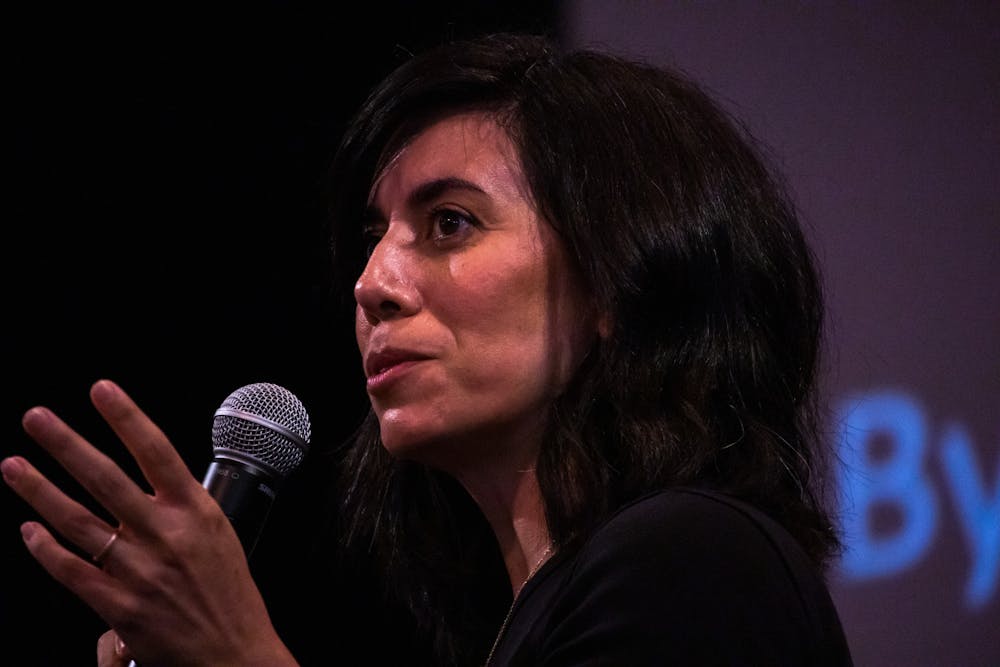By Rachel Lea
Correspondent
Between convocation and being introduced to their academic departments, the class of 2027 and transfer students finished their summer reading requirement by attending the keynote address delivered by author Cristina Henríquez at Kendall Hall. The summer reading program serves to unite incoming students under a certain theme that encourages them to think critically and interact with their peers.
This year’s theme was “Access and Opportunities,” which pushed students to focus on the cultural mechanisms that either enable certain groups to advance in society or constrain them. In order to prepare them for future discussions, students read Henríquez’s “The Book of Unknown Americans” over the summer.
Even before opening the book itself, students could tell it would be different from the summer reading assignments they did during high school.
“At first, like most summer reading assignments, I wasn’t too thrilled,” explained Lucas Calderon, a freshman mechanical engineering major. “I figured, ‘Oh, it will just be another boring book about something I do not care about’… but when I knew it was about immigration experience, especially from a Latino perspective, I was a bit more interested, because that matches my family’s experiences.”
Written in 2014, “The Book of Unknown Americans” explores the lives and identities of Latin American men and women, and how those identities affect their access to opportunities in the U.S. Opinions on the narrative itself varied. While some students, for example, were satisfied with its conclusion, others saw it as anticlimactic.
Nevertheless, many students agreed that the book shed light on immigrants trying to gain visibility in a foreign land.
“I think one of the cool and kind of sad parts about the immigrant experience is that it is pretty universal,” said Ayla Hussain, a freshman English major. “You will see that immigrants tend to have the same experiences in feeling alone in America or feeling different. [The book] really touched on those ideas.”

(Artwork courtesy of Taylor Aldridge)
Students of Latin American descent especially appreciated how Henríquez revealed different aspects of hispanic culture — both positive and negative. Freshman business management major Miguel Hernandez-Delgado related to one of the main
character’s longing for the beauty of her home country, but also acknowledged that the stigma towards disabilities portrayed in the book is accurate.
“In Mexico, if you grew up with a disability, you had to deal with it,” Hernandez-Delgado said. “There is no such thing as a therapist or a psychiatrist…I would say that this book highlights an appreciation for disabilities…and how a person can recover from that if they receive love as opposed to hate and a lack of resources. With more resources, availability and love, a person can become who they were meant to be.”
The summer reading experience itself had been revised to promote creativity and independence. Whereas students from previous years had to respond to one of many essay prompts based on the themes of the story, students this year had the option to respond through artwork or another form of media. They also had a chance to choose the book for next year’s class.
Interactions with the author herself were modified to encourage engagement. Henríquez was available before the keynote to sign copies of her book and talk with new fans at Trenton Hall. The keynote itself also resembled an onstage discussion in which Henríquez answered questions submitted by the students over the summer.
“It was kind of like watching an address; we just listened to her speak and then we left,” Hussain said. “[But] I think that I enjoy this format more. It felt like we had more control over what we wanted to learn from the author and we could ask about the topics that we were actually interested in.”

(Photo courtesy of Rachel Lea / Correspondent)
After the address, students were divided into groups around campus to discuss the book in person. Topics ranged from typical analysis questions, such as characters and points of view, to student’s own experiences with immigration and stereotypes.
Many students felt the summer reading program reinforced the College’s commitment to diversity and inclusion, and affirmed that they made the right choice in coming here.
“Something I have been seeing here at [the College]...has been the inclusive environment — seeing people express their roots, be happy with their roots and kind of want to learn about each other — so that is something I really am thankful for,” said Herdnandez-Delgado. “I look forward to a great year here at [the College].”







